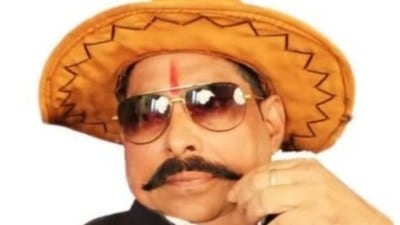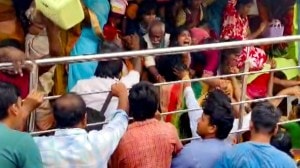Click here to follow Screen Digital on YouTube and stay updated with the latest from the world of cinema.
Tale of Two Cities
Kammattipaadam, screened by The Indian Express Film Club in Delhi, steered the conversation towards Kerala’s gritty, multi-layered politics
 Audience during the screening of Kammattipaadam
Audience during the screening of Kammattipaadam
The towering skyscrapers of cities disguise its foundation, layered with manipulation, coercion and violence. Cinematographer and director Rajeev Ravi’s award-winning offering, Kammattipaadam, a crime-drama, presents this unsettling reality. Marking two years of The Indian Express Film Club, the Malayalam film was screened at the Stein Auditorium, India Habitat Centre on Monday.
The narrative is geared by Krishnan (Dulquer Salmaan), who returns to Kammattipaadam in search of his childhood friend, Ganga (Vinayakan). He finds that the slum where he grew up no longer exists and in its place are high-rises, erasing people and memories from the land. The film serves as a strong voice of dissent against the caste system as well as modern policies of development. The Indian Express film critic Shubhra Gupta led conversations on the film as people drew parallels between the film and Anurag Kashyap’s Gangs of Wasseypur, for the way violence is used as a medium to tell the story. Gupta questioned how we deal with violence in our films, and how quickly we become immune to it.
While senior journalist Ramesh Menon saw Kammattipaadam as an extension to what is on the ground in Kerala — the real estate mafia, the displacement, and unemployment, J John decoded the politics of the land. “The film presents the social history of Kerala across four to five decades. How the communist movement empowered different stratas in society, and in the process how the dalits were left out.”. JNU professor Nivedita Menon spoke of the strong women characters, even if the film leaned towards masculinity. While some lauded the initiative of the Film Club in bringing them cinematic gems that normally go unnoticed, others found the discussions enriching. “We often don’t get to watch films like this especially as regional cinema gets restricted to a particular audience. The informal discussions after the film only add to the experience,” said PR consultant Jayashree Narayanan.
The Indian Express Film Club that started in April 2015 in Delhi, began hosting screenings in Mumbai three months later. It is a platform for discerning readers to watch, discuss and dissect the country’s most influential cinema. The next film screening will be held in May.


- 01
- 02
- 03
- 04
- 05
































